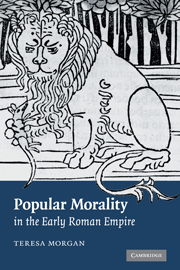Book contents
- Frontmatter
- Contents
- Preface
- List of illustrations
- List of tables
- List of abbreviations
- 1 Introduction
- PART ONE
- PART TWO
- PART THREE
- 10 The importance of being miscellaneous
- 11 Popular morality and high philosophy
- 12 Morality inter alia
- Conclusion
- Appendix 1 The political and literary connections of Babrius
- Appendix 2 The definition of a miscellany
- Appendix 3 Popular morality and philosophical doctrine
- List of papyri
- Bibliography
- Index
11 - Popular morality and high philosophy
Published online by Cambridge University Press: 27 October 2009
- Frontmatter
- Contents
- Preface
- List of illustrations
- List of tables
- List of abbreviations
- 1 Introduction
- PART ONE
- PART TWO
- PART THREE
- 10 The importance of being miscellaneous
- 11 Popular morality and high philosophy
- 12 Morality inter alia
- Conclusion
- Appendix 1 The political and literary connections of Babrius
- Appendix 2 The definition of a miscellany
- Appendix 3 Popular morality and philosophical doctrine
- List of papyri
- Bibliography
- Index
Summary
As the twig is bent, so grows the tree.
English proverbThe subject of this chapter, the relationship between popular sayings and stories and the ideas of philosophical schools, has been deliberately sidestepped in the rest of our study, in the cause of assessing popular morality as far as possible on its own terms. There are two ways to approach the comparison. The more traditional is to compare popular morality with the doctrines of various philosophical ‘schools’ active in the early Empire. This kind of systematic analysis has a certain clarity and convenience, and since I have tried to show that popular morality is itself broadly systematic, there is something to be said for establishing how similar it is to any of the systems of ‘high’ philosophy. Appendix 3 makes this comparison, and I argue there that though the two systems share some terms and concepts, many others are not shared, many of the concepts which are shared are evaluated differently, and they are embedded in very different relationships and structures of thought. Above all, the orientations of popular morality and philosophical systems are very different, ‘high’ philosophy being far more idealistic. If we compare popular morality with philosophical doctrine, in sum, the two look widely divergent.
In this chapter we take a different approach, one which recent writing by classical philosophers suggests may be more fruitful because it better reflects the way philosophers of the early Empire thought, behaved and saw themselves.
- Type
- Chapter
- Information
- Popular Morality in the Early Roman Empire , pp. 274 - 299Publisher: Cambridge University PressPrint publication year: 2007



